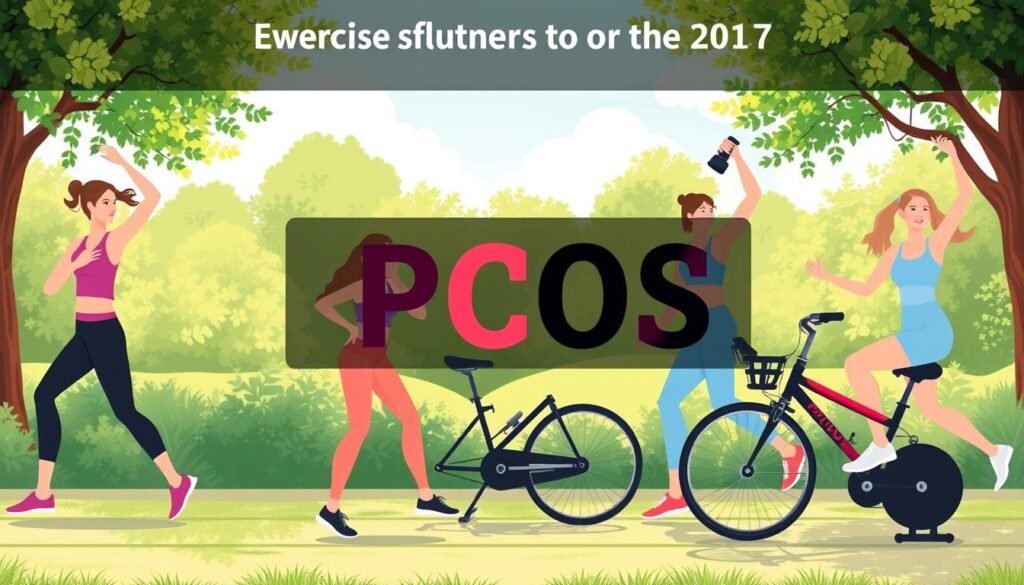Between 5% and 21% of women battle with Polycystic Ovary Syndrome (PCOS). Studies reveal they’re four times more prone to depression, showing a clinical prevalence rate of about 37%. This highlights how PCOS deeply impacts reproductive and metabolic health, along with mental wellness. Women with PCOS face emotional challenges due to hormonal imbalances and physical limits. This creates a strong need for effective management methods. One promising path is how physical activity aids mental health in PCOS, showcasing fitness perks for these patients.
Adding regular workouts to daily routines can reduce anxiety and depression linked to PCOS. It also boosts overall emotional health. Thus, it’s crucial for women with PCOS to see physical activity as a key part of their treatment. Research underlines the vital role of exercise in enhancing life quality and mental health for those with PCOS. For in-depth insights, the link between exercise and PCOS mental health outcomes is well documented in this study examining the mental health outcomes.
Key Takeaways
- PCOS affects 5-21% of women, significantly impacting their mental health.
- Those with PCOS are four times more likely to experience depression.
- Engaging in 150-300 minutes of moderate-intensity exercise weekly is recommended for improvement in psychological state.
- High-intensity interval training (HIIT) has shown greater improvements in mental health outcomes in women with PCOS.
- Physical activity can alleviate anxiety and depression symptoms, enhancing overall well-being.
Understanding PCOS and Its Impact on Mental Health
Polycystic Ovary Syndrome (PCOS) is a major concern for many women. It affects about 12-21% of women in their reproductive years. They deal with issues like irregular periods and too much androgen. The PCOS overview shows these problems can also hurt mental health. This makes it important to care for the emotional health of those dealing with PCOS.
Overview of Polycystic Ovary Syndrome (PCOS)
Dealing with PCOS can make emotional health worse. Women with PCOS often face a bigger risk of mental health problems, such as depression and anxiety. These can come from hormonal changes or pressure from society about body image. Women with PCOS tend to feel more depressed than those without it. They also have higher anxiety, showing the big impact PCOS can have.
Mental Health Challenges Associated with PCOS
Women with PCOS often face tough mental health challenges. Studies show they are way more likely to have depression or anxiety compared to others. This can make them feel not good enough and in great need of support. Their mental health struggles can make everyday life harder. This shows how vital it is to help these women. Support and good management plans are crucial.
How Physical Activity Supports Mental Health in PCOS
Women with Polycystic Ovary Syndrome (PCOS) often struggle with their mental health. Regular exercise can greatly help, improving their mood and emotional stability. It does more than just keep the body fit; it boosts self-esteem and fights off depression.
Benefits of Exercise on Psychological Well-being
Studies show active women with PCOS feel better mentally. They have less anxiety and depression. By working out regularly, they build confidence and feel more in control. This isn’t just because they reach their fitness goals but also see positive changes in their bodies.
Physical Activity as a Therapeutic Option
Exercise programs designed for women with PCOS can do wonders for both mind and body. For example, HIIT can improve both reproductive health and decrease anxiety. Experts suggest 150 minutes of exercise per week. This helps with both mental and physical health. Just a short workout can greatly lower stress, showing how powerful exercise can be for well-being.
| Study Findings | Impact on Mental Health |
|---|---|
| Regular Exercise Participation | Lower depression scores in women with PCOS |
| 150 Minutes of Moderate Activity | Improved overall health, reduced symptoms of distress |
| HIIT vs. MICT | Greater mental health benefits and symptom reduction |
| 20 Minutes of Activity Weekly | Reduced odds of psychological distress |
The Connection Between Physical Activity and Hormonal Imbalance
It’s important to know how physical activity affects hormones, especially for women with PCOS. Hormonal issues in PCOS can lead to health problems like insulin resistance and gaining weight. But exercising regularly can help balance these hormones.
Understanding Hormonal Fluctuations in PCOS
Women with PCOS see big changes in insulin and androgen levels. These fluctuations can cause weight gain and raise the risk of other health issues. About 5-15% of women of childbearing age have PCOS. This makes it crucial to handle its symptoms well.
Role of Exercise in Hormonal Regulation
Regular exercise helps balance hormones by making the body more sensitive to insulin. Studies find that both aerobic and resistance exercises can reduce testosterone levels. This is key for women with PCOS. Staying active not only helps hormonally but also supports mental health, easing PCOS’s psychological effects.

Exercise Barriers for Women with PCOS
Women with polycystic ovary syndrome (PCOS) face unique exercise challenges. Understanding these barriers helps tailor health and wellness approaches. Issues include both physical restrictions and mental blocks to physical activity.
Common Physical Limitations
Physical setbacks often disrupt the active routines of women with PCOS. These include:
- Obesity: Nearly half are obese, affecting their ability to exercise.
- Fatigue: Many report constant tiredness, lowering their motivation.
- Chronic Pain: Persistent pain discourages sticking to exercise plans.
Studies show these limitations are more common in women with PCOS, restricting their activity levels.
Psychological Barriers to Physical Activity
Mental health challenges also deter regular exercise. These challenges involve:
- Low Self-Confidence: Self-doubt can stop them from exercising.
- Fear of Injury: Concerns about getting hurt limit trying new activities.
- Negative Body Image: Poor self-image affects their motivation negatively.
Research highlights a tie between these mental hurdles and worsened depression and anxiety in PCOS. Physical activity, however, can lessen depression symptoms.
Addressing PCOS exercise barriers is key to more effective health strategies. Tailoring support to each woman’s needs helps overcome these obstacles. For more on mental health and exercise, check out this study.
Motivators for Engaging in Physical Activity
Being active greatly boosts overall health for women with PCOS. They often start exercising to reach certain health goals in PCOS care, like losing weight and feeling mentally better. These goals help women begin and stick with their fitness plans.
Personal Health Goals and Medical Conditions
Women with PCOS set health goals that push them to stay active. They work on weight management, which helps with both metabolism and PCOS symptoms. Achieving these goals makes life better overall.
Knowing about conditions common in PCOS, like insulin resistance and depression, also motivates them. Learning that losing a bit of weight can have big benefits encourages them to keep going.
Support Systems and Social Influences
Support from others is crucial. Family, friends, and doctors all help keep up the exercise. They give motivation, especially when it’s tough, making it easier to stick to health goals for PCOS.
Social circles are key too; community programs and online groups build connections. A strong network makes it easier to face challenges and maintain an active life.

Types of Exercise Beneficial for PCOS
Women with Polycystic Ovary Syndrome, or PCOS, benefit from various exercises. The right workout plan can greatly improve their symptoms and overall health. It’s key to mix aerobic exercises with strength training for managing PCOS well.
Aerobic vs. Resistance Training
Aerobics help women with PCOS by improving heart health and insulin sensitivity. Simple activities like walking, running, biking, or swimming for 30 minutes a day can make a big difference. Meanwhile, strength exercises such as squats and push-ups build muscle and boost metabolism.
Combining these helps with losing 5-10% of body weight. This is important for lowering high testosterone and bettering insulin resistance.
Mind-Body Approaches: Yoga and Pilates
Yoga and Pilates offer more than just fitness benefits for PCOS. They reduce stress and boost mental health, crucial for women facing PCOS’s emotional impacts. Doing these activities regularly can improve insulin function and uplift your mood.
Adding them to your routine takes a whole-body approach to manage PCOS. It’s a must for a well-rounded exercise plan. For more insights on exercise and PCOS, check out this resource.

Creating a Sustainable Fitness Routine
Starting an exercise routine for PCOS needs careful planning. It’s not the same for every woman. Custom fitness plans help match exercises with what you like and your goals. This makes working out more fun and doable.
Individualizing Fitness Plans for PCOS
Making a fitness plan that fits you takes knowing what you can do. It includes:
- Finding activities you enjoy, like swimming or biking.
- Setting easy goals, such as doing 30 minutes of exercise a day.
- Keeping track of your progress to stay motivated.
Research says working out 2 or 3 times a week is good for your health. Even 30 minutes, three days a week, can help with PCOS.
Strategies for Incorporating Physical Activity into Daily Life
To keep up with exercise, make it a regular part of your day. You can:
- Treat workout times as important appointments.
- Join fitness groups or online classes to find friends who support you.
- Try different activities to find what’s fun for you.
These tips can help make exercise a fun habit. Linking exercise to feeling good mentally is key. For tips on lowering stress and improving your mood, check this resource.
A good exercise plan for PCOS boosts not just your body, but your mind and mood too. Enjoying your workouts and having plans that fit you are key to managing PCOS well.
PCOS Lifestyle Modifications Beyond Exercise
Dealing with Polycystic Ovary Syndrome (PCOS) is complex. Lifestyle changes are key, not just exercise. Adding improved nutrition and mental health measures, better sleep, and stress control is crucial. This approach helps enhance the well-being of those living with PCOS.
Importance of Nutrition in Mental Health
Eating well is vital for your body and mind. Women with PCOS are more likely to gain weight. PCOS lifestyle modifications can help manage this. A healthy diet supports weight control and improves insulin sensitivity, vital for symptom management. Nutrition and mental well-being are linked. Eating whole foods like fruits, veggies, lean meats, and healthy fats boosts mood and lowers anxiety.
Sleep and Stress Management Techniques
Good sleep is crucial for mental health. Lack of sleep can worsen PCOS-related depression and anxiety. Better sleep hygiene improves life. Managing stress is also key. Mindfulness, relaxation, and meditation help with stress. These practices improve mental well-being and help manage PCOS symptoms.
Research Findings on Exercise and Mental Health Outcomes
Recent studies have explored how exercise can affect the mental health of women with PCOS. Seven studies were reviewed to see how physical activity impacts mental health. They found exercise greatly improves quality of life and decreases depression and anxiety in those who are active. However, the research on this topic is not vast enough.
Only one study looked at exercise without combining it with other treatments. Many studies did not compare the results to a group that did not exercise, showing a need for more detailed research.
Study Insights on PCOS and Physical Activity
In 2021, a review showed that exercise is really helpful for women with PCOS. Research from 2023 found that short bursts of high effort exercise can make mental health and life quality better for these women. Different types of exercise can help in various ways, suggesting tailored workouts could be best.
Recommendations for Future Research
Future studies should aim to understand how exercise affects specific mental health issues. Most people in these studies were 32 years old, mostly White, and worked full time. They also had an average life quality score of 2.7. It’s important to look into how people’s views on exercise benefits and hurdles can influence their mental health.
For example, seeing more benefits in exercise led to better life quality scores. But, an increase in depression symptoms could lower these scores. This shows we need to delve deeper into these relationships to improve mental health strategies for women with PCOS.
Conclusion
Physical activity is key in managing PCOS, especially for better mental health and overall well-being. Studies show that women with PCOS often have more severe depression and anxiety. So, adding regular exercise to daily life is important. It helps reduce depression and improves life quality, making it easier to handle PCOS.
However, many women with PCOS find it hard to start exercising. They may feel not confident or worry about physical limits. Healthcare providers need to understand these issues. With the right support, women can make exercise a part of their life. Exercise is not just about movement; it also involves eating right, sleeping well, and managing stress. This creates a full plan for healthier living.
To beat PCOS, staying active and getting support is crucial. Healthcare professionals and support groups play a big role. They help women feel inspired, strong, and ready to include exercise in their life. This leads to better mental and emotional health, raising the life quality for those dealing with PCOS.